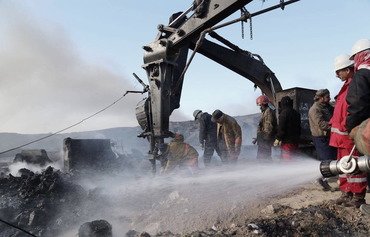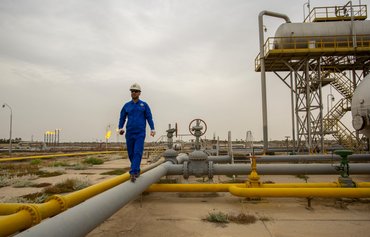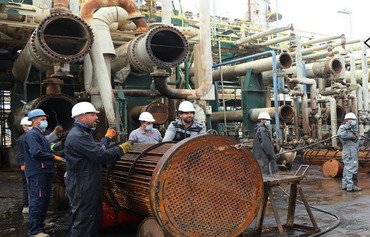The Iraqi Ministry of Oil on Tuesday (October 16th) announced it has successfully reactivated a number of oilfields and refineries damaged by the "Islamic State of Iraq and Syria" (ISIS).
The ministry's companies are continuing their efforts to repair the oil infrastructure in cities affected by the ISIS incursion, especially those in the north of the country, ministry spokesman Assem Jihad told Diyaruna.
"We have put forward ambitious plans to put all oil installations that have become dysfunctional as a result of terrorist attacks back to service at their former capacities and to develop them," he said.
"We focus our work on the rehabilitation of oilfields and refineries," he added, noting that the ministry has succeeded in reactivating many facilities, notably al-Qayyarah, al-Kisk, Haditha and Baiji refineries.
![Iraqi technicians are seen repairing damaged parts in al-Siniya oil refinery, which suffered damage at the hands of ISIS, in a photo posted online on July 17th. [Photo courtesy of the North Oil Refineries Company]](/cnmi_di/images/2018/10/16/14958-Siniya-oil-refinery-600_384.jpg)
Iraqi technicians are seen repairing damaged parts in al-Siniya oil refinery, which suffered damage at the hands of ISIS, in a photo posted online on July 17th. [Photo courtesy of the North Oil Refineries Company]
Work is under way to increase the oil derivatives production capacities of these refineries, Jihad said, noting that earlier this month, the Ajil oilfield in Salaheddine province was brought back online.
The refinery has an initial production capacity of 6,800 barrels of crude oil per day, he said.
Production in Ajil oilfield stopped completely -- as did production at facilities in several other Iraqi provinces -- when ISIS overran it in mid-2014, and its elements engaged in large-scale looting and vandalism of the three main wells.
Ajil oilfield back in action
"Technical staff of the North Oil Company, along with supporting companies, have built two oil wells (in Ajil) that have begun pumping crude oil through pipelines to the Baiji refinery" in northern Salaheddine, Jihad said.
A third well is under construction, he said, and there are hopes that by the end of the year, the work to fully rehabilitate and develop the field will be completed.
This would increase Ajil's production capacity to about 17,000 barrels per day, he said.
The gas processing system associated with production in the field also has been reactivated, he added.
"The unit has been rehabilitated, and we have succeeded in producing 100 million standard cubic feet of gas per day and delivering it to the National North Gas Company and power plants," he said.
The field's restoration to activity is "a major achievement", Jihad said.
It was achieved after "a hard and dangerous effort", as the rebuilding required to first clear the field of war remnants and mines ISIS elements had planted throughout the facility, he said.
"Our work is continuing to rehabilitate the rest of the destroyed fields," he said, adding that "our plans are moving forward".

![The Ajil oilfield in Iraq's Salaheddine province, seen here in an October 12th photograph, is back in production after being rehabilitated. [Photo courtesy of the North Oil Company]](/cnmi_di/images/2018/10/16/14957-Ajil-oilfield-Salaheddine-600_384.jpg)






